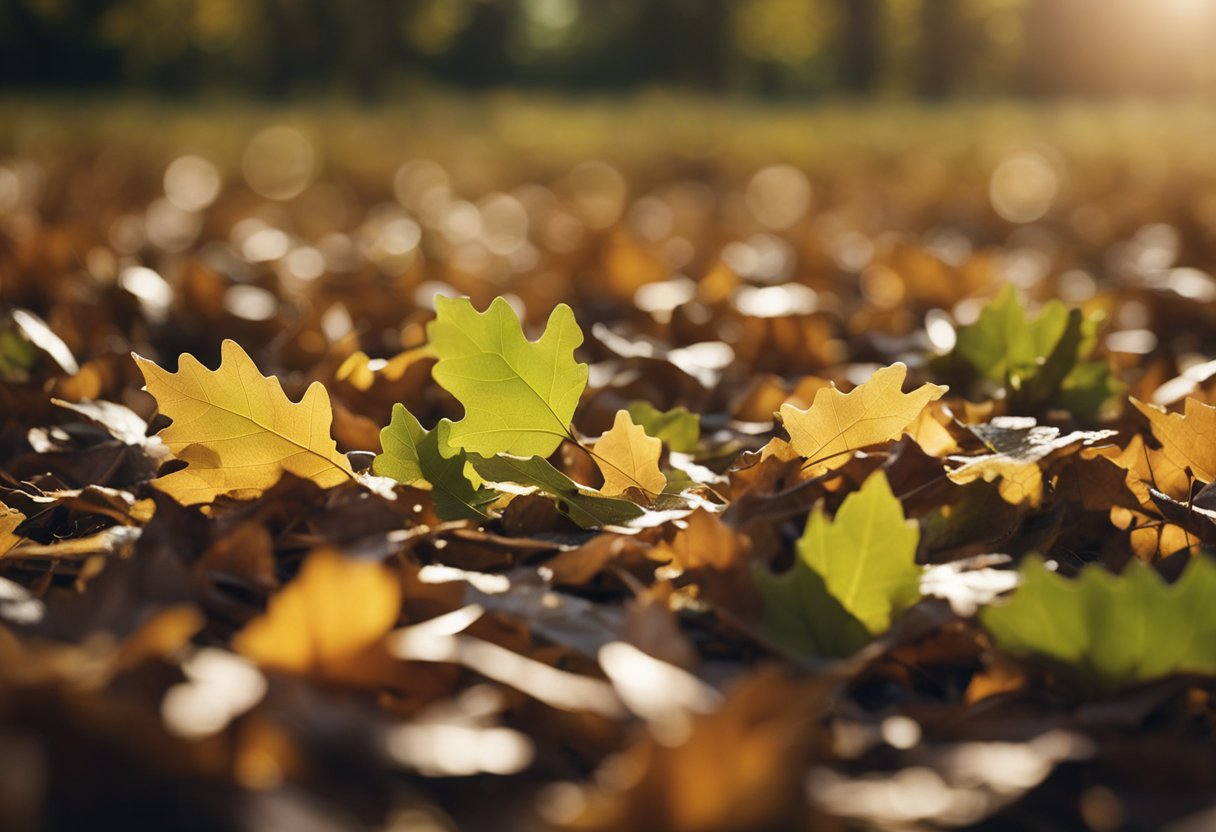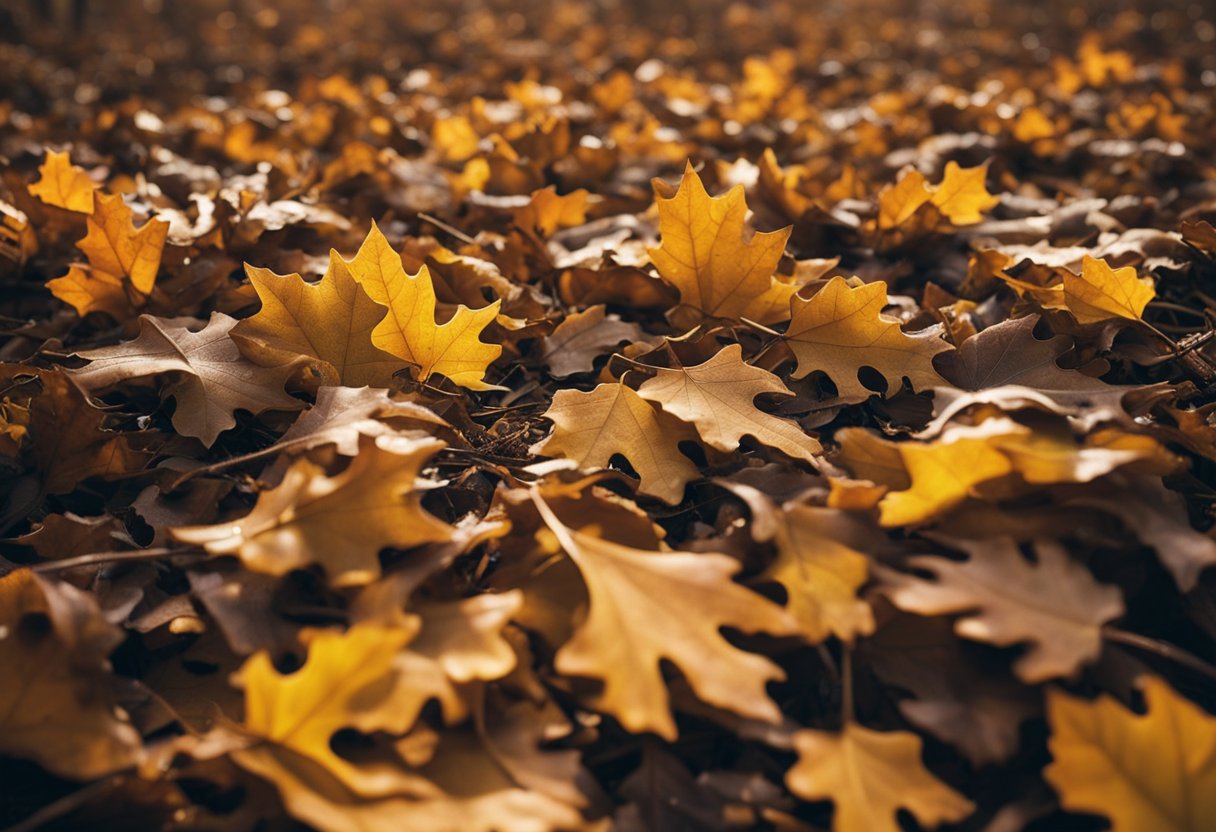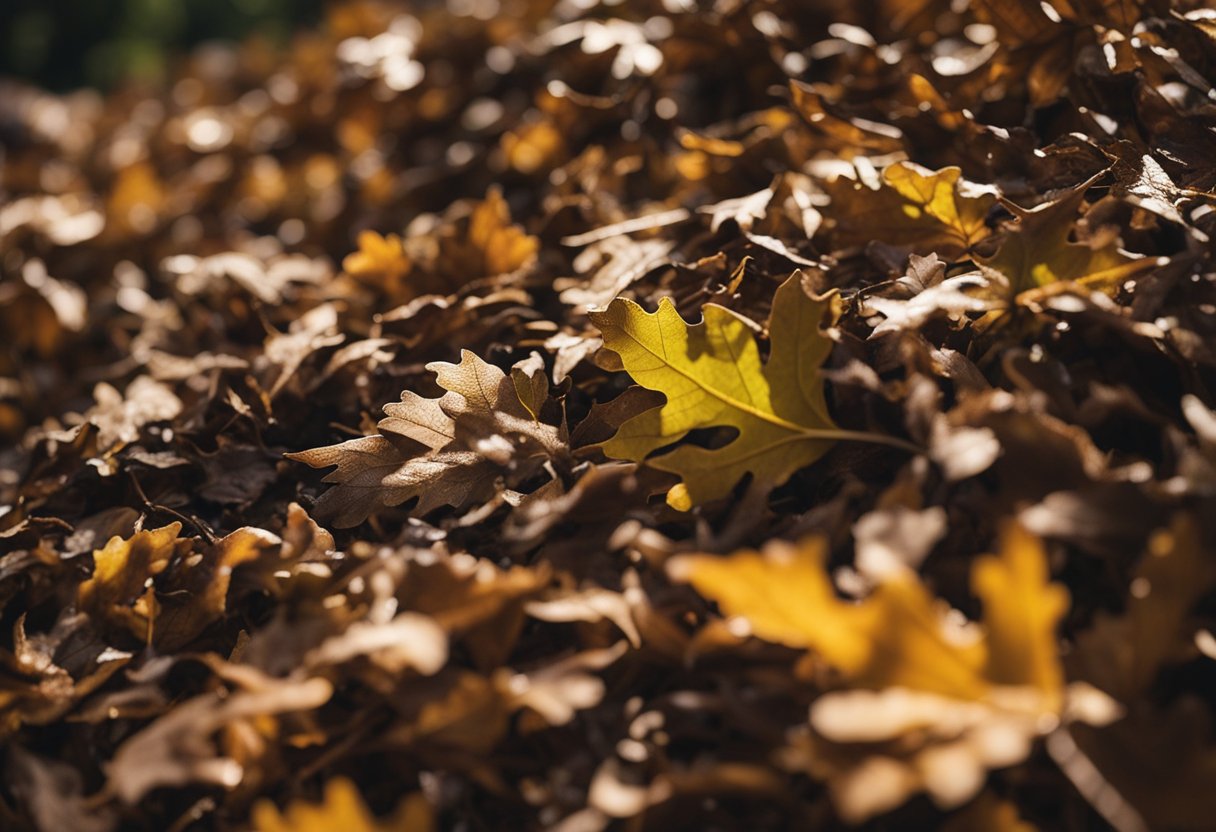As an Amazon Associate I earn from qualifying purchases.
At A Glance
Yes, you can compost oak leaves, but there are some considerations to keep in mind. Oak leaves tend to be more acidic and tougher compared to other types of leaves, which can slow down the decomposition process. It’s advisable to shred or chop them into smaller pieces to help speed up decomposition. Mixing oak leaves with other types of leaves or adding a good balance of “green” material (nitrogen-rich like food scraps) to your compost pile can also help neutralize the acidity and promote a more balanced composting process.
Composting is a great way to reduce waste and create nutrient-rich soil for your garden. However, not all materials are suitable for composting. If you have a lot of oak leaves in your yard, you may be wondering whether or not they can be composted. The answer is yes, you can compost oak leaves, but there are some things you should keep in mind.

First, it’s important to note that oak leaves are acidic when fresh, with a pH level of around 4.5 to 4.7. However, as they break down, they become much closer to neutral. This means that if you’re adding oak leaves to your compost pile, you may want to balance the acidity by adding some alkaline materials such as lime or wood ash. Additionally, oak leaves are tough and can take a long time to break down, so it’s a good idea to shred them into smaller pieces before adding them to your compost pile.
Overall, composting oak leaves can be a great way to add nutrients to your soil and reduce waste. However, it’s important to keep in mind the acidity of fresh oak leaves and the fact that they can take a long time to break down. By shredding them and balancing the pH, you can create a healthy and productive compost pile.
Understanding Composting
Composting is a natural process that breaks down organic matter into nutrient-dense soil. The composting process involves the decomposition of organic matter, such as food scraps, yard waste, and other organic materials, by microorganisms like bacteria, fungi, and worms. These microorganisms break down the organic matter into smaller pieces, which eventually turn into compost.
The composting process requires a balance of carbon and nitrogen, known as the carbon-to-nitrogen ratio. This ratio should be roughly 30:1, with 30 parts carbon to 1 part nitrogen. Oak leaves are considered a high-carbon material, which means they have a carbon-to-nitrogen ratio of around 60:1. This means that if you want to compost oak leaves, you need to balance them out with high-nitrogen materials, such as grass clippings or kitchen scraps.
Composting is an excellent way to reduce waste and create nutrient-rich soil for your garden. It also helps to reduce greenhouse gas emissions by diverting organic waste from landfills, where it would otherwise decompose and release methane, a potent greenhouse gas.
In summary, composting is a natural process that involves the decomposition of organic matter into nutrient-dense soil. The composting process requires a balance of carbon and nitrogen, and oak leaves are considered a high-carbon material. To compost oak leaves, you need to balance them out with high-nitrogen materials. Composting is an excellent way to reduce waste and create nutrient-rich soil for your garden while also helping to reduce greenhouse gas emissions.
Why Compost Oak Leaves?

I believe that oak leaves are a great addition to any compost pile. They are a readily available source of organic matter that can help to improve soil structure, nutrient content, and overall soil health. Oak leaves are also rich in lignin, which is an organic polymer that helps to form cell walls in wood, bark, and leaves. While lignin can be difficult to break down, it is an important component of healthy soil and can help to improve soil structure and water retention.
One of the benefits of composting oak leaves is that they can help to improve soil structure. When added to a compost pile, oak leaves can help to create a soil structure that is more porous and better able to absorb and retain water. This can help to reduce water runoff and erosion, while also improving the overall health of your garden soil.
Another benefit of composting oak leaves is that they can help to increase the nutrient content of your soil. Oak leaves are rich in a variety of nutrients, including nitrogen, phosphorus, and potassium. When added to a compost pile, these nutrients are broken down and released slowly over time, providing a steady source of nutrition for your plants.
In addition to improving soil structure and nutrient content, composting oak leaves can also help to reduce waste and save money. Instead of throwing away your oak leaves, you can turn them into a valuable resource that can help to improve the health of your garden soil.
Overall, I believe that composting oak leaves is a great way to improve the health and productivity of your garden soil. Whether you are a seasoned gardener or just starting out, composting oak leaves is a simple and effective way to improve the health and vitality of your garden.
The Role of Oak Leaves in the Compost Pile
When it comes to composting, oak leaves can be a great addition to your compost pile. However, there are a few things you should keep in mind when composting oak leaves.
One of the most important factors to consider is the decomposition time of oak leaves. Oak leaves take longer to decompose than other types of leaves, which means they may take longer to break down in your compost pile. To speed up the process, it’s a good idea to shred or chop your oak leaves into smaller pieces before adding them to your compost pile.
Another factor to consider is the acidity of oak leaves. While oak leaves are acidic, they won’t necessarily make your compost pile too acidic. In fact, the acidity of oak leaves can help balance out the pH of your compost pile. However, if you’re concerned about the acidity of your compost pile, you can add lime or wood ash to help neutralize it.
Tannins are another factor to consider when composting oak leaves. Tannins are compounds found in oak leaves that can slow down the decomposition process. However, tannins can also help prevent pests and diseases in your compost pile. If you’re concerned about tannins slowing down the decomposition process, you can add nitrogen-rich materials like grass clippings or vegetable scraps to your compost pile to help balance it out.
In summary, oak leaves can be a great addition to your compost pile. While they may take longer to decompose and contain tannins, their acidity can help balance out the pH of your compost pile. By shredding your oak leaves and adding nitrogen-rich materials, you can help speed up the decomposition process and create a healthy, nutrient-rich compost for your garden.
Composting Oak Leaves: Step by Step Guide

Composting oak leaves is a great way to recycle autumn’s bounty and create nutrient-rich soil for your garden. Here is a step-by-step guide to composting oak leaves:
- Shred the oak leaves prior to composting. Oak leaves take a long time to decompose, ranging from 6 to 12 months, but shredding them will speed up the process. You can use a leaf shredder or a lawnmower to shred the leaves into smaller pieces.
- Decide whether you want to make a compost pile or use a compost bin. Your compost pile should measure approximately three by three feet and will sit in your garden or yard for a considerable period. A compost bin is a contained system that can be moved around and is ideal for smaller spaces.
- Choose a location for your compost pile or bin. The location should be in a well-draining area with good air circulation. Avoid placing your compost pile or bin under trees or in direct sunlight.
- Add the shredded oak leaves to your compost pile or bin. Mix the oak leaves with other organic materials such as grass clippings, vegetable scraps, and other garden waste. Use a pitchfork to mix the materials together.
- Add moisture to your compost pile or bin. Oak leaves need moisture to decompose properly, so make sure to keep the pile or bin moist. Add water as needed to keep the pile or bin damp but not soaked.
- Turn your compost pile or bin regularly. Turning your compost pile or bin every few weeks will help speed up the decomposition process and ensure that all the materials are breaking down evenly.
Composting oak leaves is a great way to reduce waste and create nutrient-rich soil for your garden. By following these simple steps, you can turn your autumn leaves into a valuable resource for your garden.
Using Oak Leaf Compost in Your Garden
I have found that oak leaves make excellent compost for my garden plants. Composting oak leaves can help fertilize your garden and improve soil quality. Oak leaves are rich in minerals and nutrients that are beneficial for plants, making them an ideal addition to your compost pile.
When using oak leaf compost in your garden, it’s important to ensure that the compost is fully decomposed. Finished compost should be dark brown and crumbly, with no recognizable pieces of leaves or other materials. This ensures that the compost is fully broken down and won’t rob your plants of nitrogen as it continues to decompose in the soil.
To use oak leaf compost in your garden, you can simply spread it over the soil and mix it in with a garden fork or tiller. This will help distribute the nutrients throughout the soil and provide a rich source of organic matter for your plants.
Another way to use oak leaf compost is to spread it over your lawn. This can help improve soil quality and promote healthy grass growth. Simply spread the compost over your lawn and rake it in lightly to ensure it’s distributed evenly.
Overall, composting oak leaves is a great way to improve soil quality and provide a rich source of nutrients for your garden plants. Just be sure to fully decompose the compost before using it and distribute it evenly throughout your garden or lawn.
Sure, here’s the section:
Composting with Worms
As a vermicomposting enthusiast, I can confidently say that composting with worms is an efficient and fast method to turn organic waste into nutrient-rich soil. Red wigglers, a type of worm commonly used in vermicomposting, can consume up to half their weight in food every day, and their castings (worm poop) are packed with beneficial microorganisms and nutrients that plants love.
When it comes to composting oak leaves with worms, there are a few things to keep in mind. First, oak leaves are acidic when fresh, with a pH between 4.5 and 5.5. However, the acidity level tends to decrease as they decompose or when mixed with rainfall. This means that oak leaves will affect soil pH only slightly, if at all.
Another thing to consider is that oak leaves can be tough and take longer to break down than other types of leaves. To speed up the decomposition process, you can shred the leaves into smaller pieces or mix them with other organic materials like food scraps, grass clippings, or shredded paper.
When composting with worms, it’s essential to maintain the right balance of carbon-rich (browns) and nitrogen-rich (greens) materials. Oak leaves are considered a brown material, so it’s essential to balance them with enough greens to ensure that the worms have enough nitrogen to break down the leaves. A good rule of thumb is to aim for a ratio of 2:1 browns to greens.
In summary, composting oak leaves with worms is a great way to turn fall leaves into nutrient-rich soil. By shredding the leaves and balancing them with enough greens, you can speed up the decomposition process and provide your plants with a steady supply of organic nutrients.
Common Questions About Composting Oak Leaves
Composting oak leaves is a great way to recycle the fall bounty and enrich your soil. However, there are some common questions people have about composting oak leaves. In this section, I will answer some of these questions.
How long do oak leaves take to compost?
Oak leaves take longer to compost than other leaves due to their high tannin content. Tannins are compounds that can slow down the decomposition process. Oak leaves can take anywhere from 6 months to 2 years to fully compost. To speed up the process, shred the leaves into smaller pieces before adding them to the compost pile.
Is it safe to compost oak leaves?
Yes, it is safe to compost oak leaves. Contrary to popular belief, oak leaves are not toxic. However, oak leaves are high in tannins, which can lower the pH level of the soil if added in large quantities. To avoid this, mix oak leaves with other compost materials such as grass clippings, vegetable scraps, and shredded paper.
How should I compost oak leaves?
To compost oak leaves, shred them into small pieces and mix them with other compost materials. Layer the compost materials in a bin or pile and keep it moist. Turn the pile every few weeks to aerate it and speed up the decomposition process. Oak leaves can also be used as mulch around trees and shrubs.
In conclusion, composting oak leaves is a great way to recycle fall leaves and improve the health of your soil. While oak leaves take longer to compost due to their high tannin content, they are safe to compost and can be mixed with other compost materials to avoid lowering the pH level of the soil.
Alternatives to Composting Oak Leaves
While oak leaves can be composted, some gardeners may prefer to use different materials for their compost piles. Here are a few alternatives to consider:
Mulch
One option is to use oak leaves as a mulch instead of composting them. Mulch can help to retain moisture in the soil and suppress weeds. To use oak leaves as mulch, simply spread them over the soil around your plants. You can also shred the leaves into smaller pieces using a lawn mower with a mulching blade before applying them as mulch.
Leaf Mold
Another option is to create leaf mold, which is a type of compost made from leaves. Leaf mold is a great soil amendment that can help to improve soil structure and fertility. To make leaf mold, simply pile up your oak leaves in a corner of your yard and let them decompose over time. You can also speed up the process by shredding the leaves into smaller pieces before piling them up.
Other Leaves
If you don’t have oak leaves available or prefer not to use them, there are plenty of other types of leaves that can be composted or used as mulch. Maple leaves, for example, are a great option because they break down quickly and don’t contain as much acid as oak leaves. Other good options include leaves from black walnut, poplar, willow, elm, and fruit trees.
Overall, while oak leaves can certainly be composted, there are plenty of other options to consider as well. By using mulch or creating leaf mold, you can still reap the benefits of these leaves without having to worry about their acidity or slow decomposition.
Environmental Benefits of Composting Oak Leaves
Composting oak leaves offers numerous environmental benefits, making it an ideal way to dispose of yard waste. By composting oak leaves, we can reduce the amount of waste that ends up in landfills, improve soil quality, and promote healthier gardens.
One of the primary benefits of composting oak leaves is that it reduces the amount of yard waste that ends up in landfills. When yard waste is sent to a landfill, it takes up valuable space and releases methane gas, a potent greenhouse gas that contributes to climate change. By composting oak leaves, we can divert this waste from landfills and reduce our environmental impact.
Composting oak leaves can also improve soil quality. As oak leaves break down, they release nutrients into the soil, improving its fertility and promoting healthy plant growth. Additionally, composting oak leaves can help to improve soil structure, making it easier for plants to absorb water and nutrients.
For gardeners, composting oak leaves can be especially beneficial. Healthy soil is essential for growing healthy plants, and composting oak leaves can help to create the ideal growing environment. By adding composted oak leaves to garden soil, gardeners can improve soil fertility, promote healthy plant growth, and reduce the need for synthetic fertilizers.
In summary, composting oak leaves is an excellent way to dispose of yard waste while also promoting healthier soil and gardens. By reducing waste sent to landfills and improving soil quality, composting oak leaves can help to reduce our environmental impact and create a more sustainable future.
